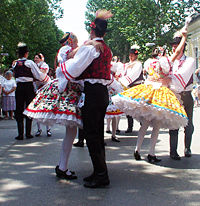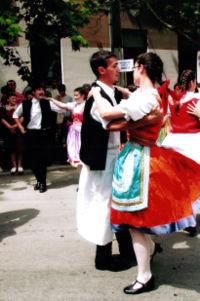- Csárdás
-
This article is about a type of folkdance. For the specific composition by Vittorio Monti, see Csárdás (Monti).
Csárdás (or Czárdás) (Hungarian: [ˈtʃaːrdaːʃ], English: /ˈtʃɑrdæʃ/ or /ˈzɑrdəs/) is a traditional Hungarian folk dance, the name derived from csárda (old Hungarian term for tavern). It originated in Hungary and was popularized by Roma music (Cigány) bands in Hungary and neighboring lands of Serbia, Slovakia, Slovenia, Burgenland, Croatia, Ukraine, Transylvania and Moravia, as well as among the Banat Bulgarians, including those in Bulgaria.[2]
Contents
History
The origin of the Csárdás can be traced back to the 18th century Hungarian verbunkos, used as a recruiting dance by the Hungarian army.
The Csárdás is characterized by a variation in tempo: it starts out slowly (lassú) and ends in a very fast tempo (friss, literally "fresh"). There are other tempo variations, called ritka csárdás, sűrű csárdás and szökős csárdás. The music is in 2/4 or 4/4 time. The dancers are both male and female, with the women dressed in traditional wide skirts, usually colored red, which form a distinctive shape when they whirl.
Classical composers who have used csárdás themes in their works include Emmerich Kálmán, Franz Liszt, Johannes Brahms, Léo Delibes, Johann Strauss, Pablo de Sarasate, Pyotr Ilyich Tchaikovsky and others. The csárdás from Strauss' operetta Die Fledermaus, sung by the character Rosalinde, is probably the most famous example of this dance in vocal music. Probably the best-known instrumental csárdás is the composition by Vittorio Monti written for violin and piano. This virtuosic piece has 7 tempo variations. A recording of Monti's tune was made by Freddie Martin and His Orchestra (Whispering: Gene Conklin) in Holywood on November 6, 1948. It was released by RCA Victor Records as catalogue number 20-3123[3] and by EMI on the His Master's Voice label as catalogue number B 9716. The tune was arranged by Ballard.
See also
References
- ^ Blatter, Alfred (2007). Revisiting music theory: a guide to the practice, p.28. ISBN 0415974402.
- ^ Kaufman, Nikolaj (2002). "Pesnite na banatskite bǎlgari" (in Bulgarian). Regionalni proučvanija na bǎlgarskija folklor. Tom 4. Severozapadna Bǎlgarija: obštnosti, tradicii, identičnost: p. 36. ISSN 0861-6558.
- ^ RCA Victor Records in the 20-3000 to 20-34999 series
Bibliography
- Sárosi, Bálint, Zigeunermusik (Gypsy Music), 1977
External links
- StreetSwing's Dance History Archives: Czardas or Csárdás
- Hungarian Lexikon
- Youtube video (Csárdás begins @ 2:35)
- Néptánc.lap.hu - Links
- Youku video - performance by Trey Lee Chui-yee
- Friss Czardas (fast Czardas)
Categories:- Hungarian styles of music
- Hungarian dances
- Hungarian music
- Hungarian loanwords
- Dance forms in classical music
- Folk dance stubs
- Hungarian history stubs
Wikimedia Foundation. 2010.


